Gender
Are Female Misogynists on the Rise?
An exploration of how the Trump campaign encourages women to hate women
Posted October 25, 2016
About a century ago, the 19th amendment was ratified to the U.S. Constitution giving women the right to vote. About a week ago, a small faction of Trump supporters tweeted the hashtag #repealthe19th to demand its repeal.
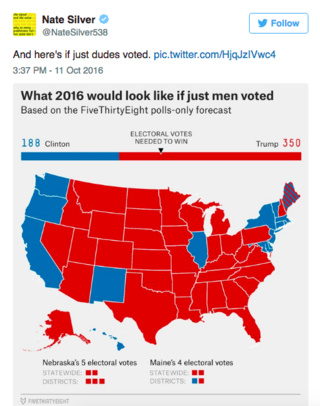
What triggered the controversial hashtag was the release of electoral maps illustrating a Donald Trump victory if only men were to vote. Another map, meanwhile, showed a Hillary Clinton win if only women voted.
Eric Trump, the candidate’s son, included the hypothetical “men-only” map in a fundraising email, extolling it as proof that the Trump campaign was making “huge gains.” But to other Trump supporters, the “men-only” map, was evidence that women were to blame if their candidate lost. Naturally, some men took to Twitter to protest. See an example here.
None of this surprises me. This is the kind of protest Twitter was built for. But what did surprise me were the following tweets:


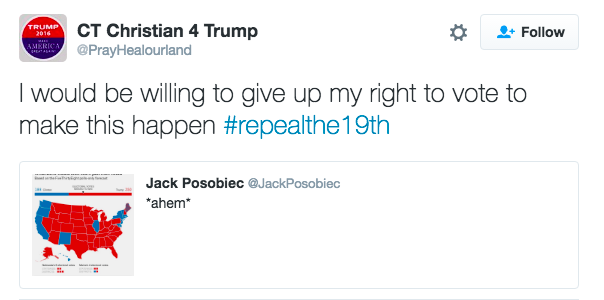
These are women.
You’re probably thinking: Are they serious?
See for yourself here and here. (Spoiler alert: they are.)
Before your head explodes, The Washington Post reports that only about 100 tweets were genuinely serious about the repeal. The vast majority used the hashtag to condemn or ridicule it.
Still, as a woman I was curious about this strange women-for-misogyny phenomenon, even if it was a small minority. While I am familiar with a few women who have been outspoken champions of female disenfranchisement and feminism, like far-right pundit Ann Coulter and conservative activist Phyllis Schlafly, I somehow assumed they were just anomalies.
What these handful of tweets suggests is that more normal, everyday women might be misogynists, too.
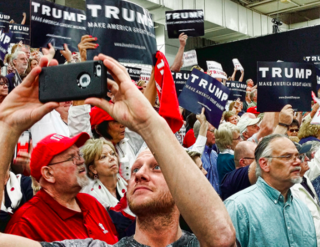
According to research conducted by The Atlantic, 90 percent of Trump supporters are in the white working class. A quick scan of his televised rallies and you’ll see this is pretty obvious.
But, what you probably didn’t realize is that women, not men, constitute a sizable percentage of his base. It turns out a quarter of white women, who are over 45 and didn’t attend college, are all passengers on the Trump Train. And, as The Atlantic points out, “They’re not poor either: Only 23 percent of Trump’s white, non-college-educated voters make less than $50,000.”
So, why, in 2016, have some of these older, middle-class, white women professed they would gladly “give up their right to vote” in order to support a man who has openly boasted about committing sexual assault and been accused of making inappropriate sexual advances on several women?
VOTE FOR PATRIARCHY
The answer may lie in their “internalized” misogyny, says Silvia M. Dutchevici, LCSW and founder of the Critical Therapy Center. Which is the “subconscious internalization of all the sexist and negative views and hatred of women that exist within our culture and ideology.”
These subconscious beliefs, she continues, “are passed down through cultural norms, messages and socialization… and requires a strict adherence to gender norms.” And, it’s also nothing new.
Remember the backlash Target faced when it introduced gender-neutral toys last year? Many irate customers, both men and women, took to social media to express their dismay.
On Fox & Friends, a psychotherapist even suggested that having gender-neutral toys could make children question their own gender — an unlikely claim considering research has proven that gender identity is determined by biology and neurology — not toy selection.
Yet despite their illegitimacy, these types of beliefs continue to be passed down from generation to generation. “Girls and women, boys and men, hear the sexist messages about women over their entire lifetimes. They hear women are stupid, weak, passive, manipulative, with no capacity for intellectual pursuits or leadership,” she adds.
Eventually, the idea sticks.
For some women it remains a subconscious bias, but for others, it becomes a conscious choice, says Dr. Nancy Irwin, a Los Angeles-based therapist.
She points out that women, in fact, “may be afraid of themselves” and fear venturing into the unknown. A valid concern, after all: “The hell we know is better than the hell we don’t know.”
Sometimes, inequality is easier. “They may have men in their lives who are ‘Trumpesque’ and are dependent on their codependent role as a trophy or ‘obedient’ female...It would be embarrassing, difficult or they would have too much too lose if they owned their own autonomy,” says Irwin.
And then, there are also those women who genuinely prefer this type of inequity. "They believe they are 'smart' for being able to manipulate men into taking care of them...They don’t have to make any tough decisions or cope with any mistakes,” she adds.
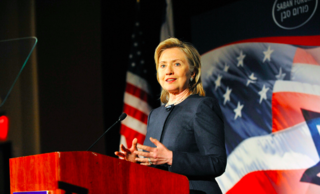
This ideology could also explain why traditionally conservative women and men do not support Hillary Clinton. Irwin says, “many cannot accept a woman as an individual outside of her mate and her looks.”
And when women like Clinton do disrupt traditional patriarchy, that’s when the trouble begins, says Dutchevici. “When women break these rules, they are seen as unruly, out of line or insubordinate. Misogyny is not an undifferentiated hatred of women, it is a hatred towards women who break the rules.”
The women who support Trump (including those who tweeted above), in fact, are a “perfect example of how socialization causes women to shame, doubt, and undervalue themselves and their gender,” she says.
WOMEN IN RELIGION

Still, there is no greater force perpetuating sexism than organized religion. Many major religions, including the Catholic Church, do not allow women in religious leadership roles. And America’s own homegrown Christian patriarchy movement, popularized by reality television families like The Duggars, tend to preach ideals, such as total female submission and rejection of higher education for women.
While this might sound misogynistic to you, Michelle Duggar, the always beatific matriarch of the family, doesn't seem to think so -- at least not on television. In fact, every week, viewers got to watch just how much she relished her role as a submissive housewife and dutiful mother of 19 children.
In a blog entry, she even shares her advice for newlywed wives on keeping their husbands happy:
“And so be available, and not just available, but be joyfully available for him. Smile and be willing to say, ‘Yes, sweetie I am here for you,’ no matter what, even though you may be exhausted and big pregnant and you may not feel like he feels.”
It is this quality of religious conviction which could explain why some women are pro-Trump—especially on social issues, like abortion. In a recent essay, conservative pundit Laura Ingraham makes an appeal to the NeverTrump faction, claiming the “GOP nominee is the only hope of saving innocent life”—and if they didn’t support him, they could not “seriously call themselves ‘pro-life’ going forward.”
The message is clear to women: no matter what, your faith must come first.
THE SOCIAL MEDIA WAR AGAINST WOMEN

Though my interest in misogynistic women was initially piqued by Trump supporters, I’ve found that they are in no way the only perpetrators.
One recent study finds that women are more likely to be misogynists than men—at least on social media. The study, which was conducted by a social intelligence company called Brandwatch, analyzed millions of tweets written in the English language and found that 52 percent of misogynistic hate speech tweets came from women, versus 48 percent from men.
And, earlier this year, think tank Demos did a similar study and found that half of misogynistic tweets (which contained the word “whore” or “slut”) came from women.
Of course, all of this, including the tweets in question, are still social media—or as I like to call it: Disneyland for trolls, where bullying and cruelty are its main attractions.
So, I wondered: Does misogyny extend to real life as well?
MISOGYNY IN THE WORKPLACE

In an essay for the Daily Mail, science journalist Vivienne Parry writes, “Modern-day misogyny is far more violent and hateful—and it’s women who are the worst offenders” She accuses her own mother, a successful business woman, of being a misogynist, “who believed the most awful thing another woman could do was ‘get above herself.’”
Parry’s mother was not alone, however. A recent Gallup poll found that both men and women preferred having a male boss in the workplace. In fact, male bosses have remained the overall preference, since the poll started in 1953.
Fellow Psychology Today blogger and psychologist, Seth Meyer, also writes about women in the workplace in a recent blog post:
“Based on 15 years of clinical work with women who represent virtually every possible demographic variable, I can assuredly report that the women I’ve worked with report more critical views of other women than the men do with their own male peers.”
And finally, there’s the 19th amendment — the one embroiled in this whole hashtag controversy. By now, it shouldn’t come as a shock to learn that not every women supported its passage in 1920.
One of its most vocal opponents was Alice Hay Wadsworth, a senator's wife and once-president of the National Association Opposed to Women’s Suffrage. The group published anti-suffrage materials which claimed that “90 percent of women either do not want it, or do not care” about voting rights and that there could “be of no benefit commensurate with the additional expense involved.”
What is painfully clear is this: Misogyny has never been a men-only problem. But for the most part, its few public perpetrators were paid little attention and did not have a legitimate public forum, until recently.
LET'S TALK ABOUT TRUMP
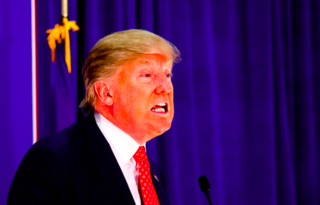
Trump’s charged rhetoric, especially his views on immigration and women, has galvanized the alt-right movement, a once-fringe group of extreme conservatives, now associated with racist, sexist, homophobic and xenophobic ideology, to come out of hiding.
In Trump, they see a solution to the “breakdown of tradition, patriarchy, authority and hierarchy,” says Pratik Chougule, a former policy coordinator for Trump’s campaign. “Even if he doesn’t know the policy issues, a lot of people respond to that.”
And while Trump is not responsible for all female misogyny, his controversial remarks have certainly helped normalize this type of attitude in the mainstream. His primitive thinking empowers others who feel the same way, says Irwin. “Seeing a billionaire model this validates their position. He proves they are ‘right!’”
In other words, at least until election day, public (and potentially viral) displays of misogyny are here to stay.
Follow me at @thisjenkim
Want to get an update when I write a new post? Sign up here.




